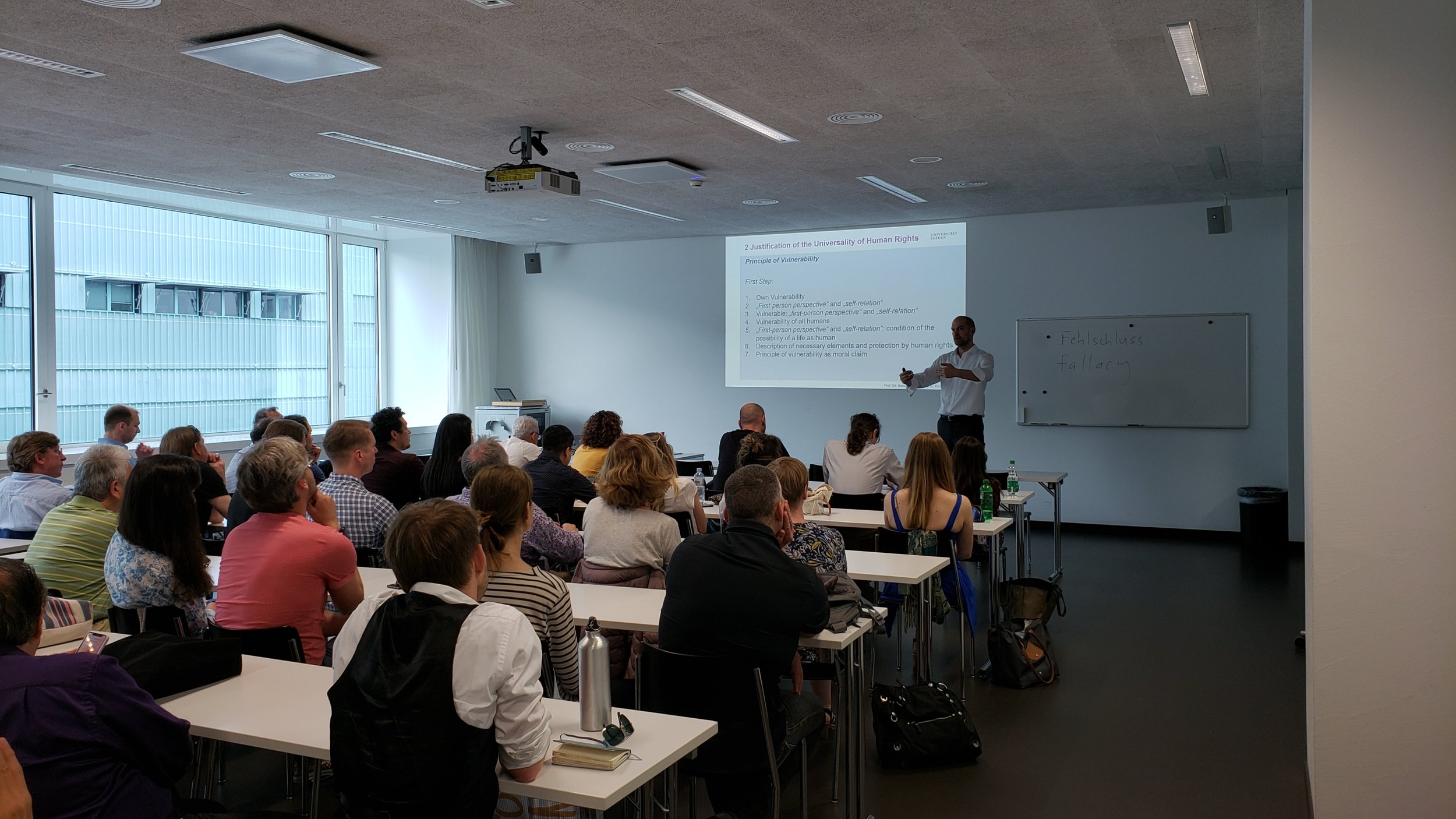Teaching and learning
Guided by human rights professors, curriculum specialists, and field practitioners, we are both learners and teachers about human rights.
Secondary Education
We enter the world of human rights with secondary school students in Switzerland and Italy through classroom activities and joint performance projects featuring professional and student musicians working side by side.
Violist Stefano Trevisan and secondary school students in Casperia, Italy
Lucerne, Switzerland
Rehearsing Riccardo Panfili’s Last Land, commemorating the Rwandan Genocide
THE project in summary
A yearlong project with secondary school students to study human rights centred upon the 20th anniversary of the genocide in Rwanda. A collaboration with the Lucerne Festival and the Kantonsschule Reussbühl, we invited Musicians Without Borders and the Boltzmann Institute for Human Rights to help design and teach. We rehearsed music with the students, culminating in a joint public concert featuring the world premiere of Riccardo Panfili’s Last Land.
PEOple
Students at a Lucerne secondary school who sing in the choir or study musical instruments outside of school; the school choir director, the education director of the Lucerne Festival, curriculum development experts and experts in training musicians to work with people from foreign cultures who are survivors of trauma.
MUsic
Umuco, a song composed by Rwandan music trainers; Bartok duos for two violins played by two teams, each comprising one student and one professional musician; a nonet by Rudolf Karel, a Czech composer who perished in Theresienstadt in 1945; and Riccardo Panfili’s Last Land, commissioned for this project.
CHANGE
Students gained a basic understanding of human rights and learned about the challenges of growing up in a post-conflict zone. They learned about the lives of professional musicians and practiced some of the techniques used in music-centred workshops for survivors of trauma. They sang in the Rwandan language and experienced studying and performing a complex modern composition. They learned that the listening skills and receptivity to diverse ideas at the core of a successful music ensemble can help develop productive personal, professional, and public interactions.
Pesaro and Ancona, Italy
Congo Lassané of Burkino Faso speaking about the right to water
the project in summary
Classroom studies, rehearsal and performance with secondary school students in the cities of Pesaro and Ancona, Italy. The topic was the right to water. Guest talks by experts from many fields placed the issue of potable water in the contexts of health, poverty, and social justice. Student and professional musicians rehearsed and performed together a new composition created for the project.
PEOPLE
Secondary school students from four schools in the provinces of Fermo and Ancona; the vocal and instrumental teachers and conductors, classroom instructors, the composer; guest talks by journalists, doctors, fieldworkers, and advocates.
Music
Diverse compositions, tunes, and improvisation all inspired by water. Composer Paolo Marzocchi wrote a new work, La meccanica del ruscello (The Mechanics of the Stream) and orchestrated it for the instruments the students were studying and members of Musicians For Human Rights.
CHANGE
Students learned about the interrelatedness of human rights, how a violation of one right might precipitate violations of other rights. They learned about the worldwide magnitude of water problems and local and international efforts to provide relief. Students studied how different composers musically express feelings about water. Through intense rehearsals both in small groups and with the entire orchestra, the students gained an understanding of the methods and skills required for successful public performance. They developed an appreciation for the dedication and efforts of their fellow students, and for the positive communal outcomes possible when each person commits to the group effort.
university education
We have worked with undergraduate and graduate university students.
Human Rights Centre, University of Padova, Italy
Teacher Training University of Lucerne, Switzerland
We have presented lectures about the intersections of music ensemble practices with human rights principles. Positing an ensemble as a complex microcosm of society, we explore how the individual responsibilities, interpersonal relationships, and concerns for a successful collective outcome can illuminate principles and practices at the heart of human rights doctrine. In seminars at the Human Rights Centre of the University of Padova, we had the opportunity to consider the roles of music in therapy, protest, torture, and empowerment.
musicians as human rights students
We organize lectures and workshops presented by leading academics for musicians to learn about human rights.
Lecture by Professor Manfred Novak to musicians and students at the European Inter-University Centre for Human Rights and Democratisation in Venice, Italy
Lecture by Professor Peter Kirchschläger at the University of Lucerne, Switzerland, to the Human Rights Orchestra between rehearsals
Since 2013, we have added lectures to our rehearsal schedules, providing musicians with the history and guiding principles of human rights, philosophical and practical contexts, and contemporary challenges. Initiated by Professor Peter Kirchschlaeger, we have been fortunate to count among our teachers world-renown professors and experts including Manfred Nowak, George Ulrich, Michael O’Flaherty, and the late Antonio Papsica.
training workshop leaders
A fieldwork training session for musicians interacting with beneficiary guests from a SPRAR refugee and asylum seeker centre
The Project in summary
In 2017 we instituted a program to train musicians in Italy to be qualified to lead music-centred workshops for refugees and asylum seekers.
people
Partnering with Musicians Without Borders, we brought two of their expert trainers to Rome to provide a three-day intensive training. 32 musicians attended, coming from Rome, Caserta, Catania, Siena, and Turin.
music
Traditional songs from many cultures and improvised body percussion, as well as rhythm exercises with percussion instruments.
change
With four of the best trainees we launched music-centred workshops for the first time, serving 121 beneficiaries in three cities.






